Destination San Jose: A Day in the Capital of Costa Rica
In this destination guide, we will travel to San Jose, the capital of Costa Rica.
A day in San José
Having dealt with some inexplicable issues at passport control, I was finally allowed into Costa Rica after my flight from Panama City.
My stopover in the country would be very short as I had just one day to explore the Costa Rican capital of San José given the fact I had an evening flight back to Europe.
Of course, I’m the first to realise that spending just one day in Costa Rica is absolutely insufficient to see anything. After all, the charms of the country can be found in the natural beauty of its national parks and pristine coastline, not in the urban chaos of its capital city.
But being keen to explore a new country, one day is of course better than nothing and absolutely beats flying back to Europe immediately and only spending some hours at the airport in between flights.
It meant I was going into the day with low expectations – hoping that one day I would be able to return to Costa Rica to venture outside San Jose having time to explore more of the country.
Heading into town
From San José’s Juan Santamaria International Airport I decided to take a public bus into town instead of the usual taxi or Uber which most travellers seem to opt for.
I found the bus service to be excellent as the comfortable TUASA bus dropped me off right in their downtown garage, just a short walk away from all the major sights of San Jose.
Bus departures from the airport to the city are frequent, so especially when there is traffic (and San Jose has quite a bit of it!) the difference in speed between the bus and a taxi isn’t actually that big.


Concrete chaos
Having spent time on this trip in the lovely Latin American cities of Panama and Bogotá, I couldn’t help but think how different San José felt. While Panama still has the seaside location on the Pacific Ocean as defining geographical feature, and Bogota the mountains, San Jose is located in a broad valley.
The consequence is that the city feels rather featureless and highly urbanised – in a bad way. Although the traffic was just as gridlocked and chaotic as in Panama and Bogota, and the Costa Rican capital felt just as crowded, it did certainly feel less charming.
My first impressions were more akin of a badly planned town somewhere in the Midwest of the United States – thrown at least two decades back in time.
Compared to the previous two South American metropolises I visited, San Jose clearly doesn’t win any award when it comes to even the least bits of urban charm. The first things you will notice when standing downtown are its charmless concrete structure, not colonial beauty.


Exploring San Jose
That said, there are certainly a couple of interesting sights to see in San Jose, and on the plus side the city does bustle with shops, restaurants and cafes.
First on my list to explore was the small Parque de la Merced and the Iglesia Nuestra Señora de la Merced opposite it, these being the nearest landmarks to the bus station where I was dropped off.
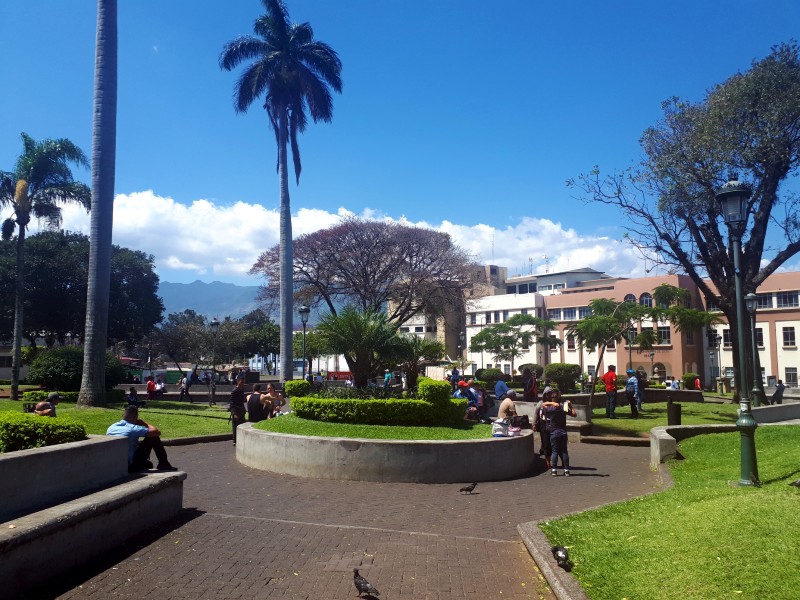


Avenida 2
From the church I started walking along Avenida 2 – basically is the main artery of the city – towards the east. Although ugly shops and department stores dominate this boulevard, there was however also the odd beautiful (or at least interesting) building to admire in between the concrete ugliness.
Take for example the Metropolitan Cathedral of San José. Built in 1871, this church blends Greek orthodox, neoclassical and baroque architectural styles and is well-worth a visit.



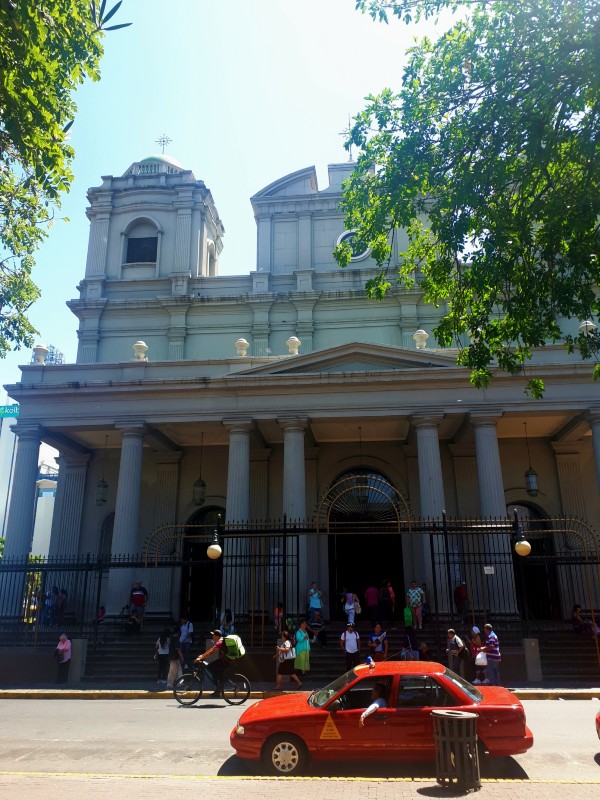

Pedestrian streets
One aspect of San Jose which I certainly did appreciate were its downtown pedestrian areas, found to both the north and south of Avenida 2. If you are travelling for two weeks or so to see the amazing natural beauty of Costa Rica, then a first stop in San Jose would definitely make sense to stock up on supplies.
In the same way, it would make sense as well to spend a few days here after a trip into the nature to savour some urban delights after spending time in less urbanised areas of the country.
There are so many shops, cafes, pubs, restaurants and fast food chains in San Jose that you will definitely find whatever big city amenity you are looking for. Heck, San Jose even seemed to have a smallish China Town!
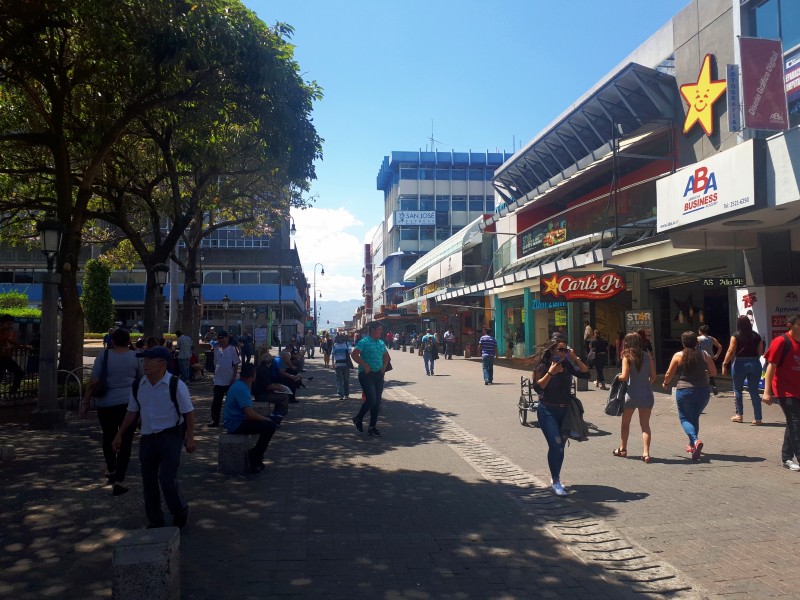

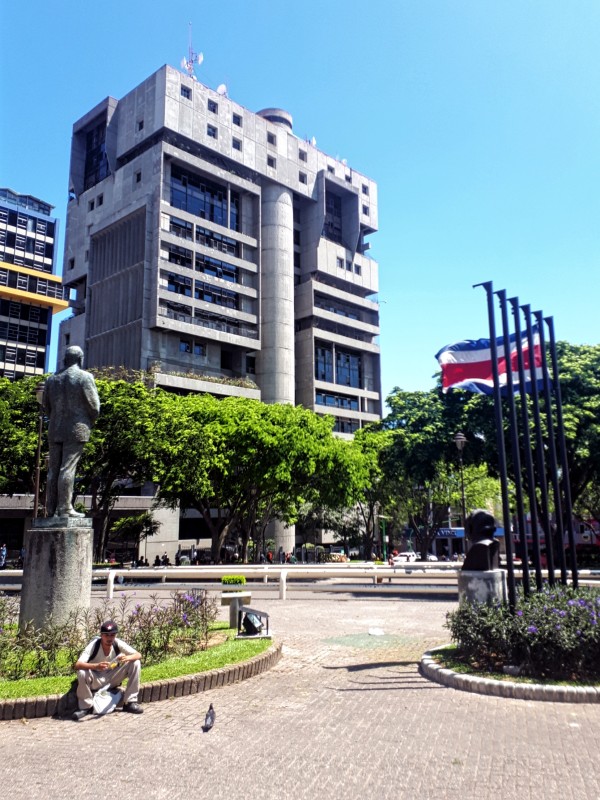

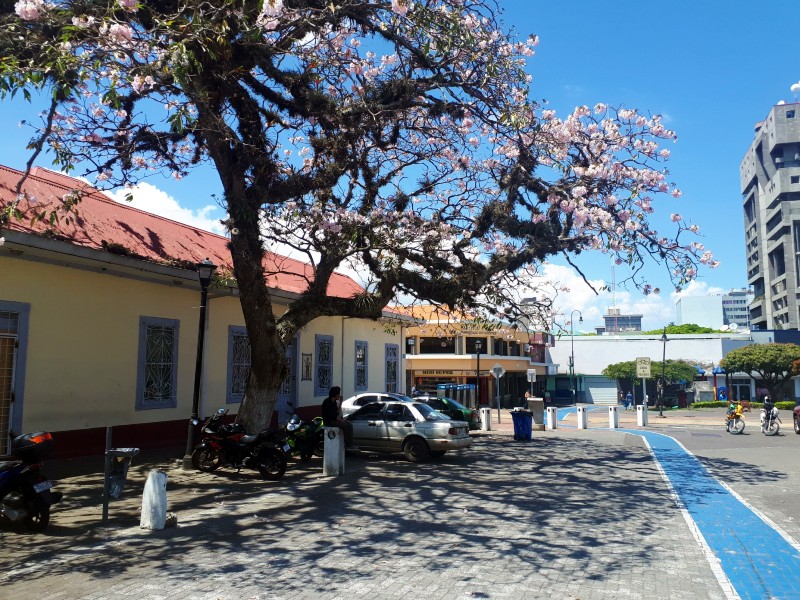
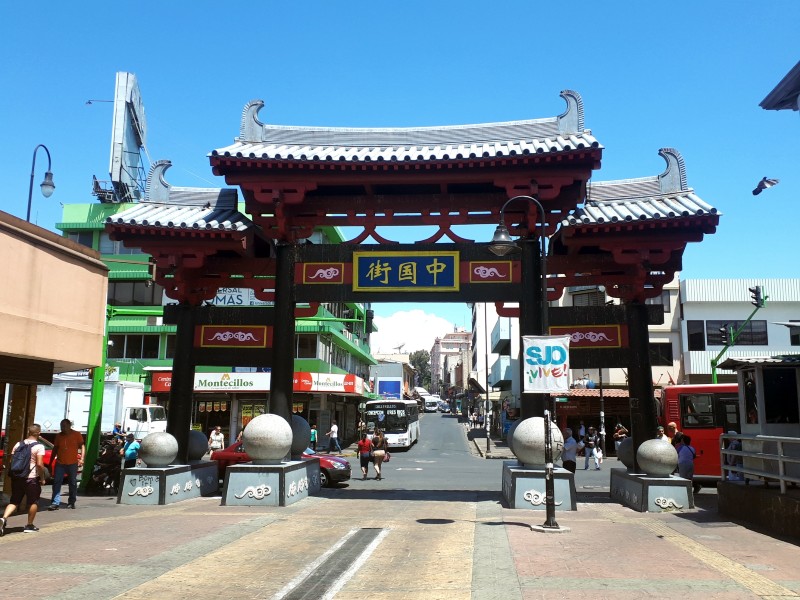
Lunch stop
As it was nearing lunchtime I stopped at an appealing looking cafe for a snack and a drink. I ordered an empanada – and it being Costa Rica some coffee to go with it as the country is famous for cultivating some good quality coffee beans.
The coffee was served old-fashioned style in what I can only describe as an old-fashioned filter looking more like a dripping condom. Plus points for originality, that at least!
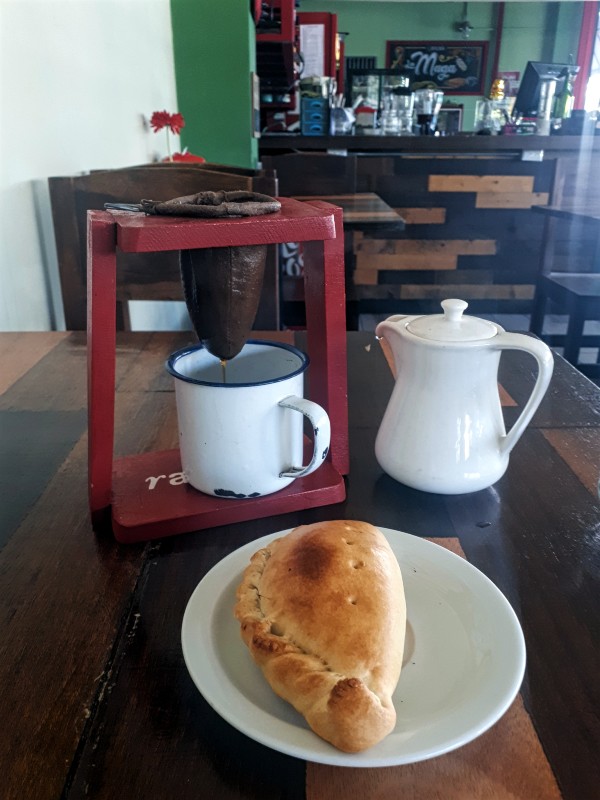
National museum
Located on the Plaza de la Democracia y de la Abolición del Ejército you can find Costa Rica’s main museum. Simply called the National Museum (Museum Nacional de Costa Rica), you can find several historic artefacts ranging from pre-Columbian archaeological pieces to Colonial era history, ending with the modern-day history of the country.
The museum is located in an appealing-looking palace, which was the place where former President José Figueres Ferrer famously announced in 1949 that Costa Rica would abolish its military.
Costa Rica is since famously known as the “Switzerland of Latin America” for its neutral politics and peaceful society. Perhaps not entirely coincidental, the country – including its capital of San Jose – is very safe to visit and doesn’t have the same safety risks as some other Latin American countries have.

Theatre
Walking back on the northern side of Avenida 2, I arrived at the national theatre of Costa Rica, built in neo-classical style. The area around the theatre is by far the nicest part of the city, having some grand-looking buildings.
One of these is the main post office of San Jose, where I bought some stamps for the Panamanian postcards which I still had as I completely forgot to send them during my days in Costa Rica’s south-eastern neighbour.
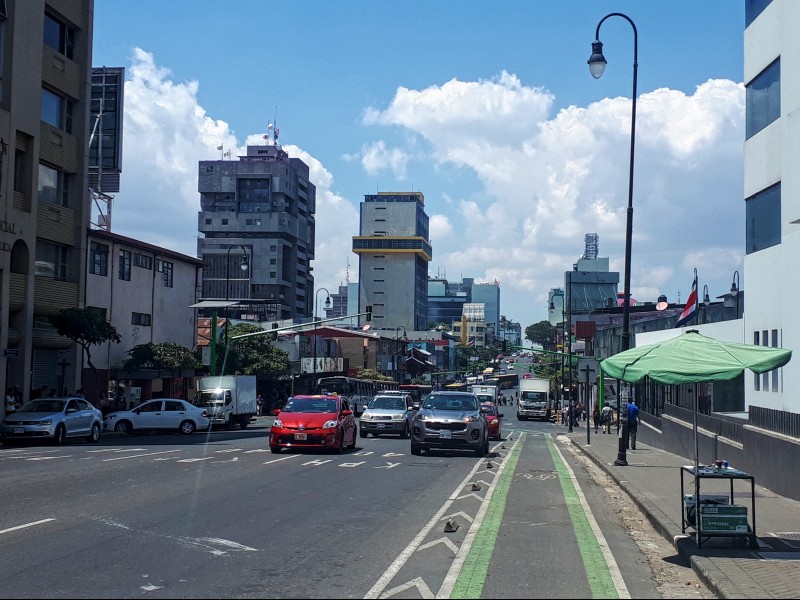
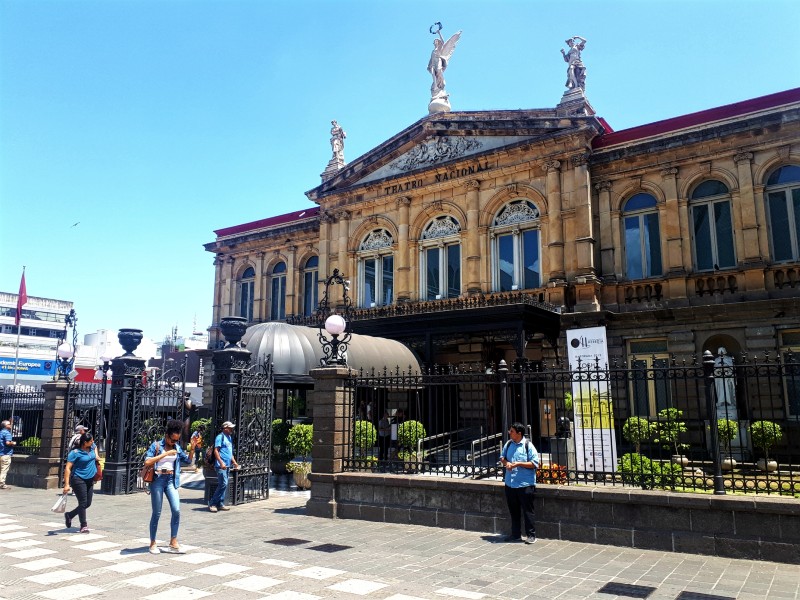

Mercado Central
My favourite part of the city was yet to come. The Mercado Central (central market) is bustling with souvenir stalls, food stores, small restaurants and all kinds of other shops. It occupies an entire city block and is a great spot to wander around.
The restaurants, where they serve quick, cheap and filling meals, are clearly mostly local-orientated places frequented by workers with signs and menus only being in Spanish. They made for an excellent place to sample some yummy food (and to get a cold beer on this scorching hot day).
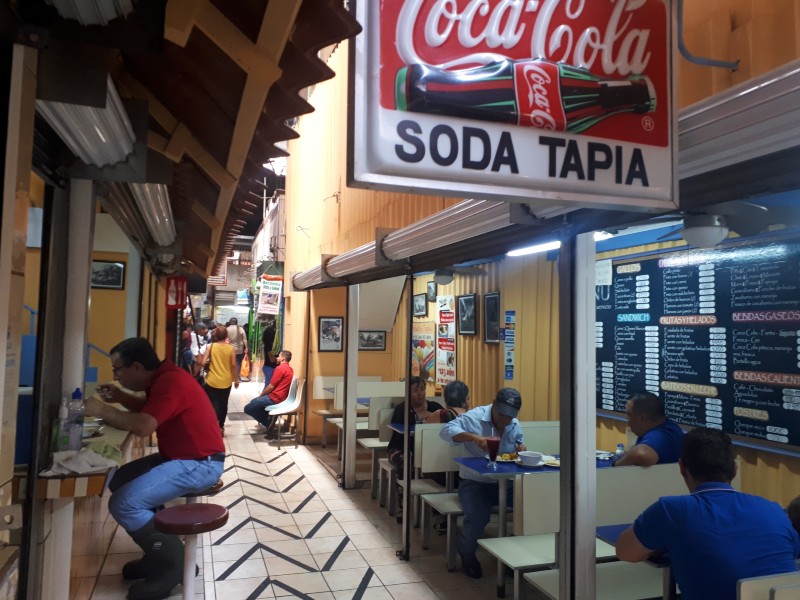

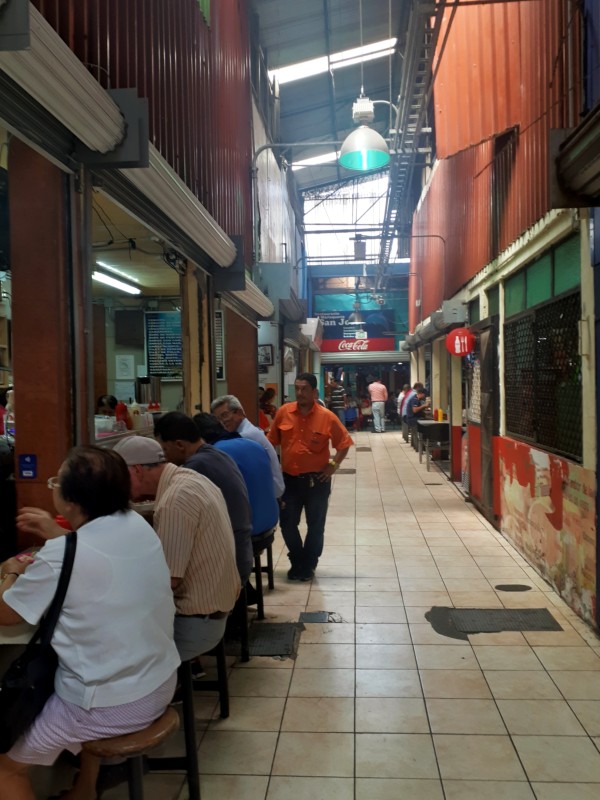


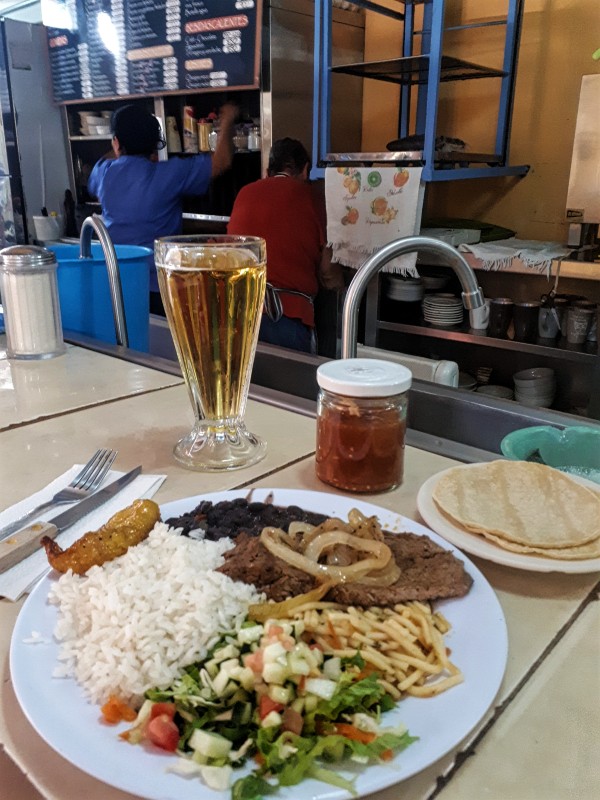

Back to the airport
After the meal it was unfortunately time to head straight to the bus station to make my way back to the airport. Given the atrocious traffic I encountered on my way from the airport to the city, I decided it was better to leave a bit early just in case.
In short
Even though I was far from impressed from San Jose and it was clearly the least charming and interesting of the three Latin American capitals I visited on this trip, I nonetheless enjoyed my day walking around town.
Although the Costa Rican capital is dominated by non-descript or even rather ugly concrete buildings as well as gridlocked traffic, it does however have some charming parts.
There are some pleasant pedestrian streets, a few interesting churches and other landmarks, as well as a good museum to look around. Visiting the bustling central market for some shopping and a meal is also a must-do activity in San Jose.
If I would come back to Costa Rica to see more of the country (which I should certainly do once given that the country does offer some of the most magnificent and easy-to-access natural highlights of all of Central America) – I would not mind it at all to explore San Jose a bit more.
When going in with the right expectations, the city can definitely grow on you, but it will never be an urban highlight of the Americas.
Trip report index
This article is part of the ‘A Piece of Panama With a Bit of Bogota and a Slice of San Jose‘ trip report, which consists of the following chapters:
1. Review: Air France Economy Class Bucharest to Paris (Airbus A320)
2. Review: Air France Business Lounge Paris CDG Airport Terminal 2E – Hall K
3. Review: Air France Economy Class Paris to Bogota (Boeing 787)
4. Review: Hotel Morrison 114, Bogota, Colombia
5. A Short One-Day Stopover in Bogota, Colombia
6. Review: Copa Club Bogota Airport, Colombia
7. Review: Copa Airlines Economy Class Panama to Bogota (Embraer RJ-190)
8. Review: Tryp by Wyndham Panama Centro
9. How to Visit the Miraflores Locks on the Panama Canal
10. Into the Casco Viejo – Exploring Panama City’s Old Town Centre
11. Isla Taboga: A Day Trip to the Island of Flowers
12. A Panama Day Trip to the Portobelo Forts and Tropical Isla Mamay
13. Review: Copa Club Panama Tocumen International Airport
14. Review: Copa Airlines Economy Class Panama to San Jose (Boeing 737-800)
15. Destination San Jose: A Day in the Capital of Costa Rica (current chapter)
16. Review: VIP Lounge Costa Rica, San Jose Airport (SJO)
17. Review: KLM Economy Class San Jose to Amsterdam (Boeing 787)
18. Review: KLM Crown Lounge (Non-Schengen) Amsterdam Airport
19. Review: KLM Economy Class Amsterdam to Bucharest (Boeing 737-800)

